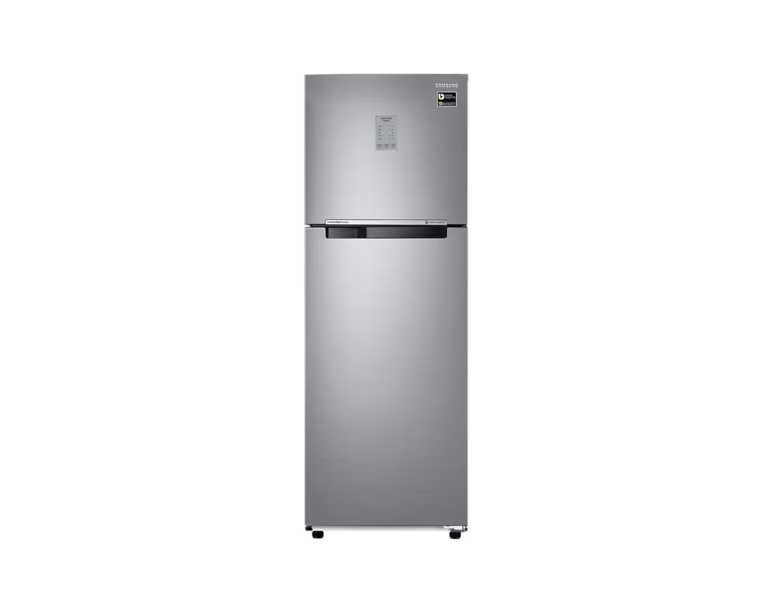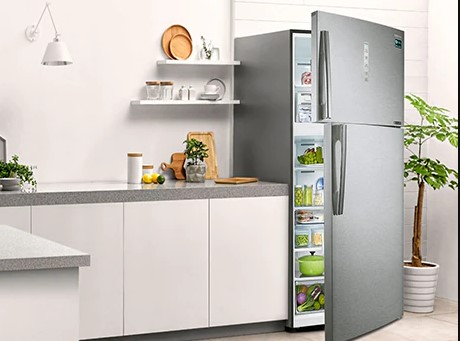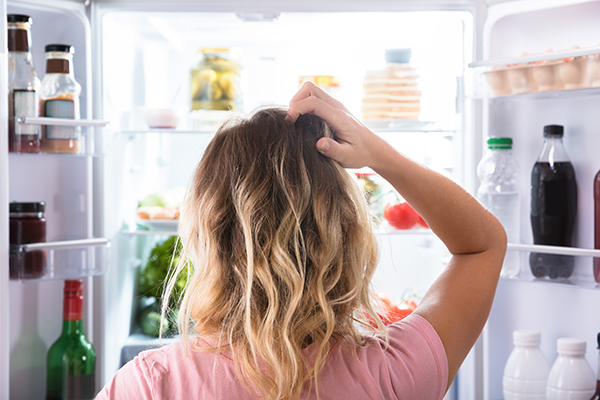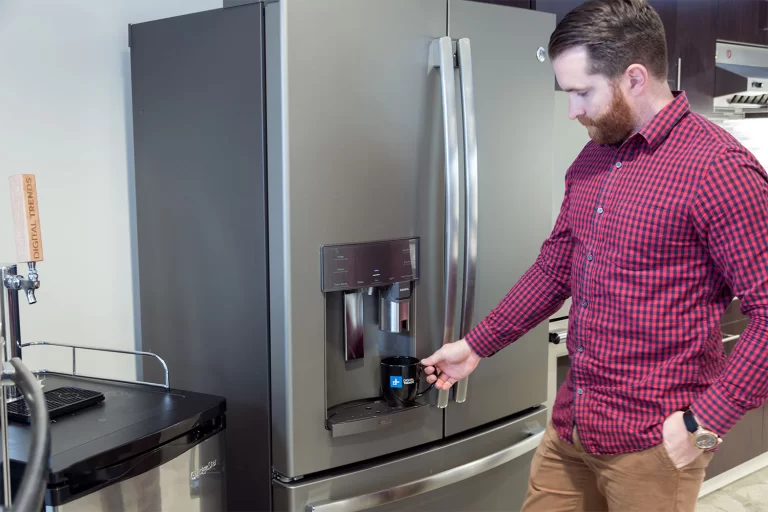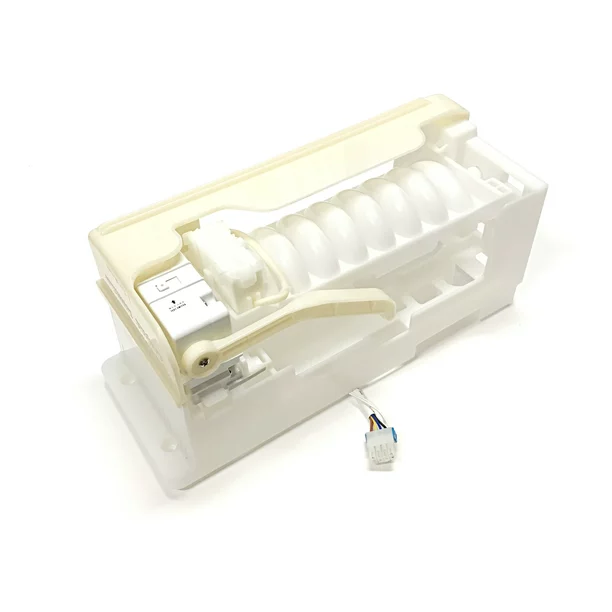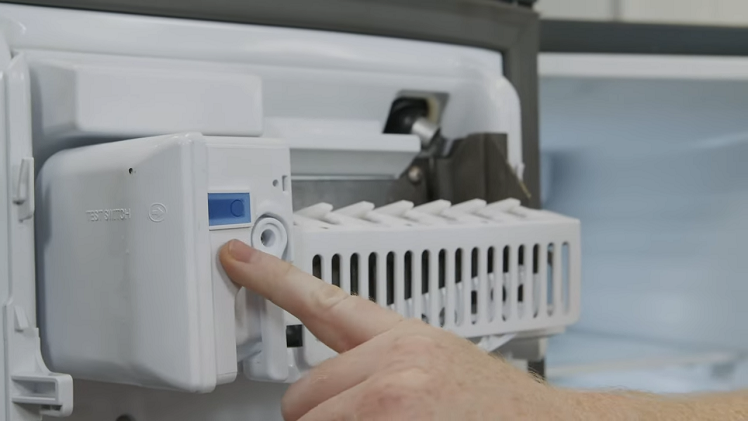Troubleshooting your GE Cafe Refrigerator problems can be a daunting task, but we’ve got your back. Whether you’re dealing with temperature inconsistencies, ice maker issues, or an unresponsive control panel, this comprehensive guide will shed light on common issues and their remedies to help you restore optimal function to your appliance.
GE Cafe Refrigerator problems can range from temperature inconsistencies and malfunctioning ice makers to issues with the water dispenser and unusual noises. Control panel problems and cooling inefficiencies are also common. Many of these problems can be addressed with regular maintenance, while others might require professional assistance for resolution.
Quick Troubleshooting Guide:
| Common Issues | Symptoms | Fixes |
| Fridge Not Cooling | Fridge is warm, but freezer is cold. | Check and clean condenser coils, adjust or replace thermostat, check evaporator fan. |
| Ice Maker Issues | No ice production or small ice cubes. | Ensure ice maker is turned on, check water supply and water filter, inspect for any blockages in the fill cup. |
| Water Dispenser Problems | Water is not dispensing or is slow. | Ensure water supply valve is open and water pressure is adequate, defrost water tube, replace water filter. |
| Temperature Inconsistencies | Fridge or freezer are not maintaining the correct temperature. | Check evaporator fan, defrost system and thermostat. |
| Noise Issues | Unusual noise from fridge. | Identify location of noise – it could be due to problems with the compressor, defrost timer, or fan motors. |
| Control Panel Problems | Control panel is unresponsive. | Try a simple power reset by unplugging and plugging back in. If it persists, the control board may need replacing. |
Common Problems and Troubleshooting GE Cafe Refrigerator
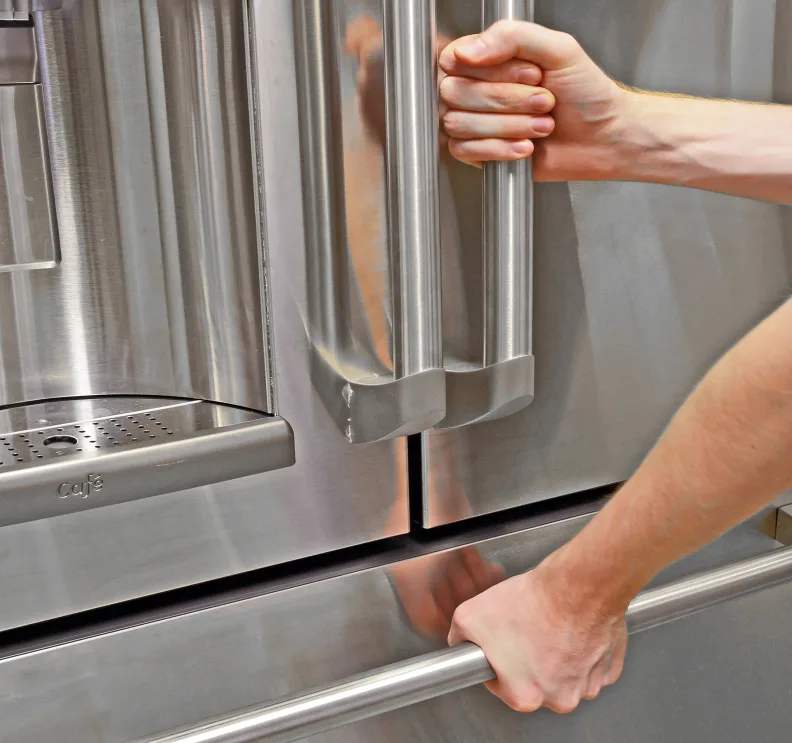
A. GE Cafe Fridge Not Cooling
One of the most frequent issues that users encounter with their GE Cafe Fridge is the appliance not cooling adequately. This problem can stem from a variety of causes, including problems with the condenser coils, thermostat issues, or a malfunctioning evaporator fan motor.
The condenser coils, located at the back of your fridge, dissipate heat as the refrigerant passes through them. If these coils are clogged with dust, dirt, or pet hair, they won’t dissipate heat effectively, causing the refrigerator to work harder and, in turn, leading to cooling issues. You can often resolve this problem by simply cleaning the coils regularly with a coil brush and vacuum.
If your fridge isn’t maintaining the temperature you set, the thermostat could be the problem. To diagnose this, adjust the thermostat to a lower setting and see if the refrigerator cools down. If it doesn’t, you may need to replace the thermostat.
Finally, if your fridge and freezer are warmer than usual, and you notice unusual noise or silence from the back of your fridge, the evaporator fan motor might be faulty. This component circulates the cold air from the coils through the compartment. If it’s not working correctly, you’ll need a professional to replace it.
Fix
- Step 1: Check the condenser coils located at the back of your fridge. If they’re clogged with dust or dirt, clean them with a coil brush and vacuum.
- Step 2: If the fridge isn’t maintaining the temperature, adjust the thermostat to a lower setting. If this doesn’t work, consider replacing the thermostat.
- Step 3: If both the fridge and freezer are warmer than usual, and you notice unusual noise or silence from the back, the evaporator fan motor might be faulty. This would need professional attention.
B. GE Cafe Refrigerator Ice Maker Issues
Ice maker problems are another common complaint with GE Cafe Refrigerators. Users may find their ice makers not producing ice, producing small or misshapen cubes, or leaking.
Several factors could contribute to these problems. The water inlet valve, which supplies water to the ice maker, could be defective or not have sufficient pressure. The ice maker assembly itself might be malfunctioning. Or the water filter might be clogged or improperly installed.
If the ice cubes are small or misshapen, check the water supply valve, the water pressure, and ensure the water filter is not clogged. If the ice maker is not making any ice, verify that the ice maker is turned on and the feeler arm is not obstructed. Sometimes, a simple reset can get the ice maker working again.
For leaks, inspect the water lines for damage and the fill cup alignment. If the issue persists despite these steps, it’s best to call a professional as these repairs can be complex and may require specific tools.
Fix
- Step 1: If the ice maker is not producing ice, check that the ice maker is turned on and the feeler arm is not obstructed.
- Step 2: For small or misshapen cubes, check the water supply valve, the water pressure, and ensure the water filter is not clogged.
- Step 3: If there’s a leak, inspect the water lines for damage and the fill cup alignment. If the issue persists, consider calling a professional.
C. Water Dispenser Problems in GE Cafe Refrigerator
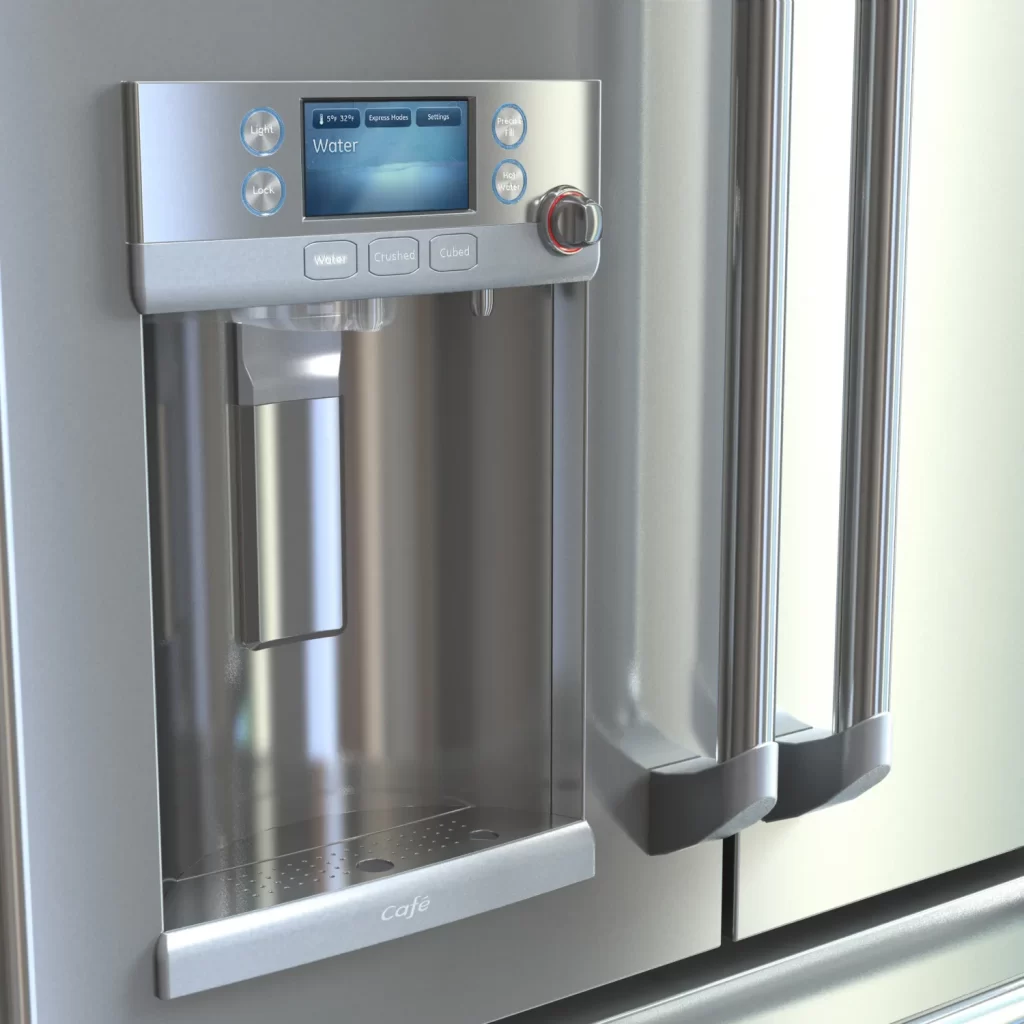
Your water dispenser can sometimes fail to dispense water, dispense slowly, or leak. These issues could be due to a faulty water inlet valve, water tube in the door being frozen, or a defective dispenser control board.
Before proceeding with more complicated solutions, first, check that the water supply valve is open, and the water pressure is adequate. If your refrigerator is not dispensing water at all, a frozen water tube could be the culprit. This issue can be resolved by defrosting the tube. However, a faulty dispenser control board would require professional attention.
The water dispenser issues could also be linked to the water filter. A clogged or incorrectly installed water filter will block the water flow. Ensure you are replacing the water filter every six months, as recommended by GE.
Fix:
- Step 1: If the water dispenser is not dispensing water or dispensing slowly, check that the water supply valve is open, and the water pressure is adequate.
- Step 2: If the issue persists, a frozen water tube might be the culprit. Defrost the tube to resolve this issue.
- Step 3: Replace the water filter every six months as recommended by GE.
D. Temperature Inconsistencies in GE Cafe Fridge
Experiencing temperature inconsistencies in your GE Cafe Fridge can lead to spoiled food and increased energy usage. There might be several reasons for this issue, including a faulty thermostat, a problem with the defrost system, or a malfunctioning fan.
If your refrigerator isn’t cooling correctly, but the freezer is working fine, a malfunctioning evaporator fan could be the culprit. This fan is responsible for circulating the air from the coils through the compartment. When it’s not working correctly, you might notice a cooling difference between the freezer and refrigerator compartments.
If both the compartments are not maintaining the correct temperature, the problem might be with the defrost system. When the defrost system isn’t functioning correctly, frost can build up on the coils, blocking the cold air from entering the compartments. You should check the defrost heater and defrost timer to ensure they are functioning properly.
Lastly, the thermostat might be faulty, causing temperature inconsistencies. You might notice that your fridge runs continuously, causing freezing in the fridge. In this case, the thermostat should be replaced.
Fix
- Step 1: If your refrigerator isn’t cooling correctly, but the freezer is working fine, consider checking the evaporator fan.
- Step 2: If both compartments are not maintaining the correct temperature, check the defrost heater and defrost timer.
- Step 3: If your fridge runs continuously causing freezing in the fridge, consider replacing the thermostat.
Read More: GE profile arctica refrigerator problems
E. Noise Issues in GE Cafe Refrigerator
If your GE Cafe Refrigerator is making unusual noises, there might be several reasons behind this. It could be due to a malfunctioning compressor, an issue with the defrost timer, or problems with the evaporator or condenser fan motor.
The compressor, which is typically located at the back of the refrigerator, can sometimes cause noise when it’s not working correctly. However, compressors are complex and high-powered components, and any work related to them should be handled by professionals.
If the noise is coming from the bottom of the fridge, the issue might be with the defrost timer. The defrost timer controls the defrost cycle of your fridge. If it’s not functioning correctly, you might hear a ticking or snapping noise.
Lastly, if the noise is coming from the inside of the freezer or fridge, the evaporator or condenser fan motor might be at fault. A quick way to check this is to open the freezer door; if the noise gets louder, then it’s likely a problem with the evaporator fan.
Fix:
- Step 1: If the noise is coming from the back of the refrigerator, it might be an issue with the compressor, which needs professional attention.
- Step 2: If the noise is coming from the bottom of the fridge, the issue might be with the defrost timer.
- Step 3: If the noise is coming from the inside of the freezer or fridge, check the evaporator or condenser fan motor.
F. GE Cafe Control Panel Problems
Issues with the control panel in your GE Cafe Refrigerator can lead to problems like the fridge not responding to input or settings not being saved. The causes for these issues can range from a simple power glitch to more serious problems like a faulty control board.
If you notice that your control panel is unresponsive, a simple reset might fix the problem. You can do this by unplugging the fridge, waiting a few minutes, and then plugging it back in. If the control panel is still unresponsive or some buttons are not working, the control board might be faulty. Replacing a control board is complex and should be done by a professional to avoid causing further damage.
Fix:
- Step 1: If your control panel is unresponsive, unplug the fridge, wait a few minutes, and then plug it back in to reset the system.
- Step 2: If the control panel is still unresponsive or some buttons are not working, the control board might be faulty. This would require professional attention.
Remember, while these are some steps you can take to troubleshoot and possibly fix issues, it’s always a good idea to consult with a professional to ensure your safety and the correct repair of your appliance.
Importance of GE Cafe Refrigerator Maintenance and Preventive Measures
Regular maintenance is key to increasing the lifespan of your GE Cafe Refrigerator and preventing potential problems. Regular tasks should include cleaning the condenser coils every six months, replacing the water filter as recommended, and checking the door seals for any leaks.
Furthermore, ensuring your fridge is level, so the doors close correctly, can prevent unnecessary energy consumption and cooling issues. It’s also essential to maintain an adequate space between the refrigerator and the wall for proper ventilation.
Check Out: GE monogram refrigerator problems
When to Consider GE Cafe Professional Repair
While some minor issues can be fixed with some troubleshooting, other more complex problems need professional attention. If you’ve tried the solutions mentioned above and your fridge is still not working correctly, or if you notice symptoms like constant cycling, water leaks, excessive noise, or the fridge is not cooling at all, it’s time to call in a professional.
Repair costs can vary based on the issue and the parts that need to be replaced. However, the typical range for GE Cafe Refrigerator repair can be between $200 and $400, according to HomeAdvisor. Remember, professional repair is an investment in the longevity of your appliance.
Understanding GE Cafe Refrigerator Warranty and Consumer Rights for Appliances
GE Cafe Refrigerators typically come with a one-year limited warranty covering any manufacturing defects. After this period, some parts may still be covered. For example, the compressor, condenser, and evaporator have a five-year warranty, and the sealed refrigeration system has a ten-year warranty.
As a consumer, you also have certain rights under the Magnuson-Moss Warranty Act. This federal law governs warranties on consumer products and stipulates that manufacturers must provide you with detailed information about warranty coverage.
FAQs
How often should I clean the condenser coils on my GE Cafe Refrigerator?
The condenser coils should be cleaned at least every six months. If you have pets or live in an environment with a lot of dust, you may need to clean them more frequently to ensure optimal cooling efficiency.
My GE Cafe Refrigerator’s ice maker isn’t producing ice. What can I do?
Start by checking the water supply valve and water pressure, and make sure the ice maker is turned on. Also, check if the water filter is clogged or needs replacing. If these steps do not solve the problem, you may need to consult with a professional, as the issue may lie with the ice maker assembly.
The water dispenser on my GE Cafe Refrigerator is dispensing slowly. What might be the cause?
The issue could be due to a faulty water inlet valve or a blocked/clogged water filter. Ensure that your water supply valve is fully open and that your water filter isn’t due for a change. If these aren’t the problem, the water tube in the door might be frozen, which can be resolved by defrosting.
My GE Cafe Refrigerator is making strange noises. Should I be worried?
Unusual noises could indicate several problems, including a malfunctioning compressor, a faulty defrost timer, or issues with the evaporator or condenser fan motor. While a humming or buzzing noise can be normal, if the noise is excessively loud, constant, or accompanied by other issues (like cooling problems), it’s best to have it checked out by a professional.
The control panel on my GE Cafe Refrigerator is not responding. What should I do?
An unresponsive control panel might just require a simple reset. Unplug the fridge, wait a few minutes, and plug it back in. If the control panel remains unresponsive, it might indicate a problem with the control board. In this case, you should seek professional assistance.
Conclusion
From understanding the common GE Cafe Refrigerator problems to their fixes, we’ve journeyed through crucial information. Regular maintenance and understanding your appliance can go a long way. But remember, when in doubt, always rely on professional assistance to ensure your refrigerator’s longevity and optimum performance. You are now equipped to tackle your GE Cafe Refrigerator issues head-on. Take control of your kitchen again!

